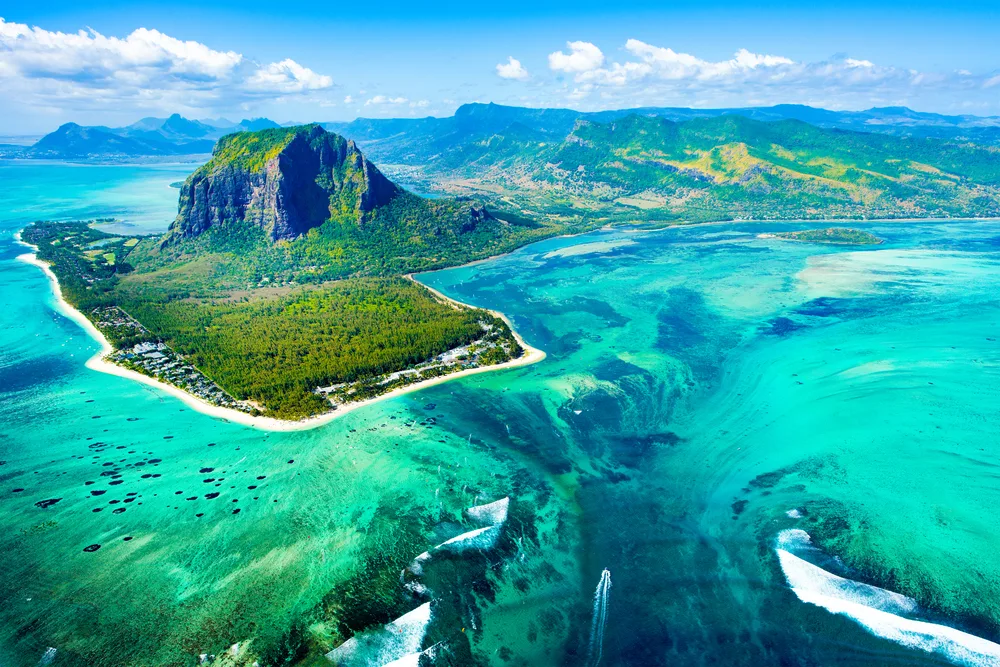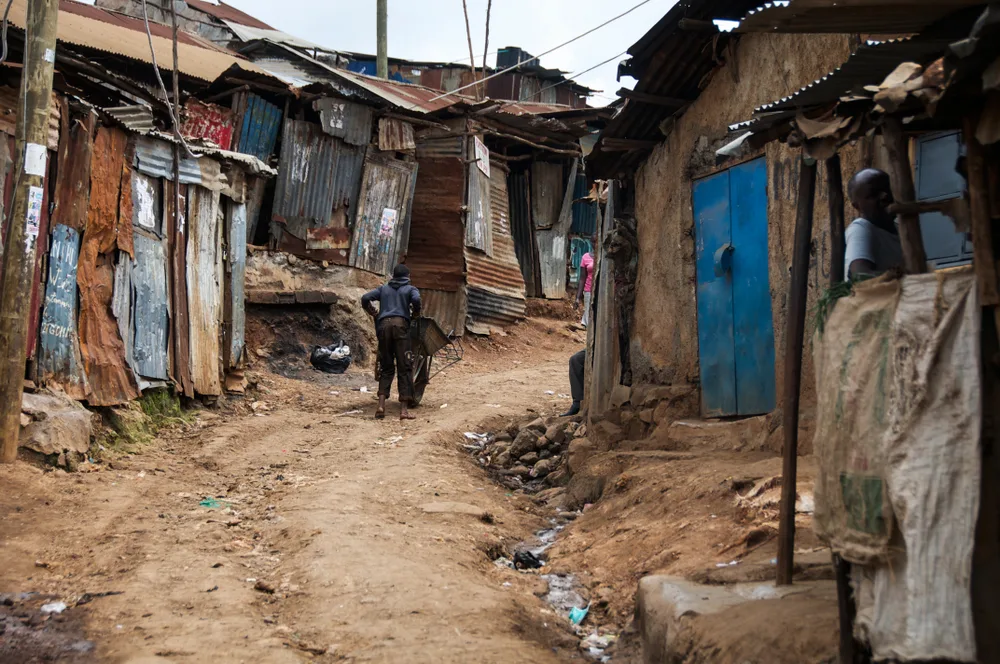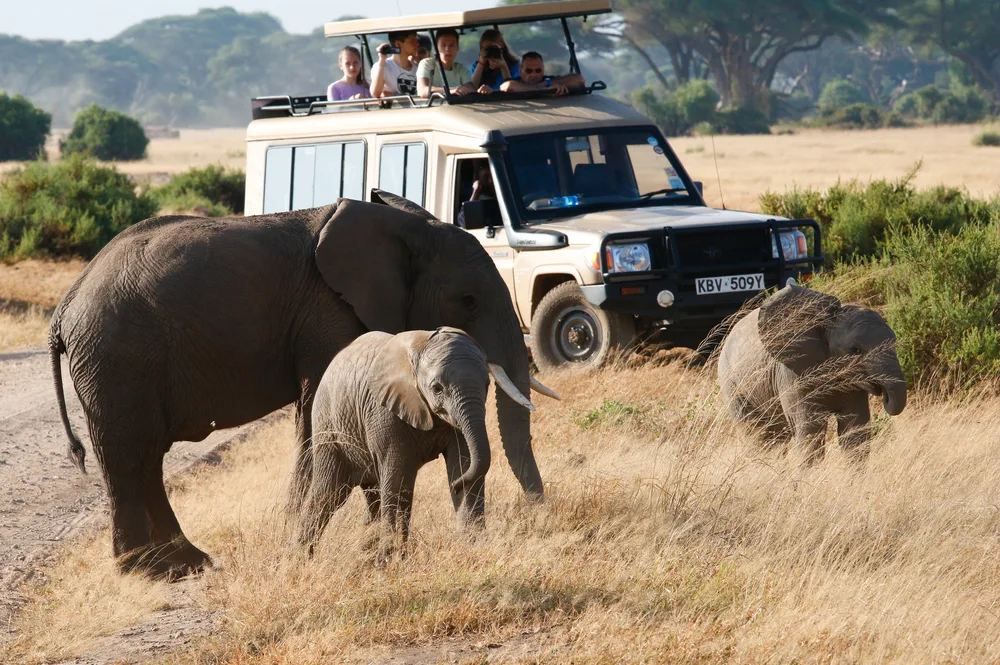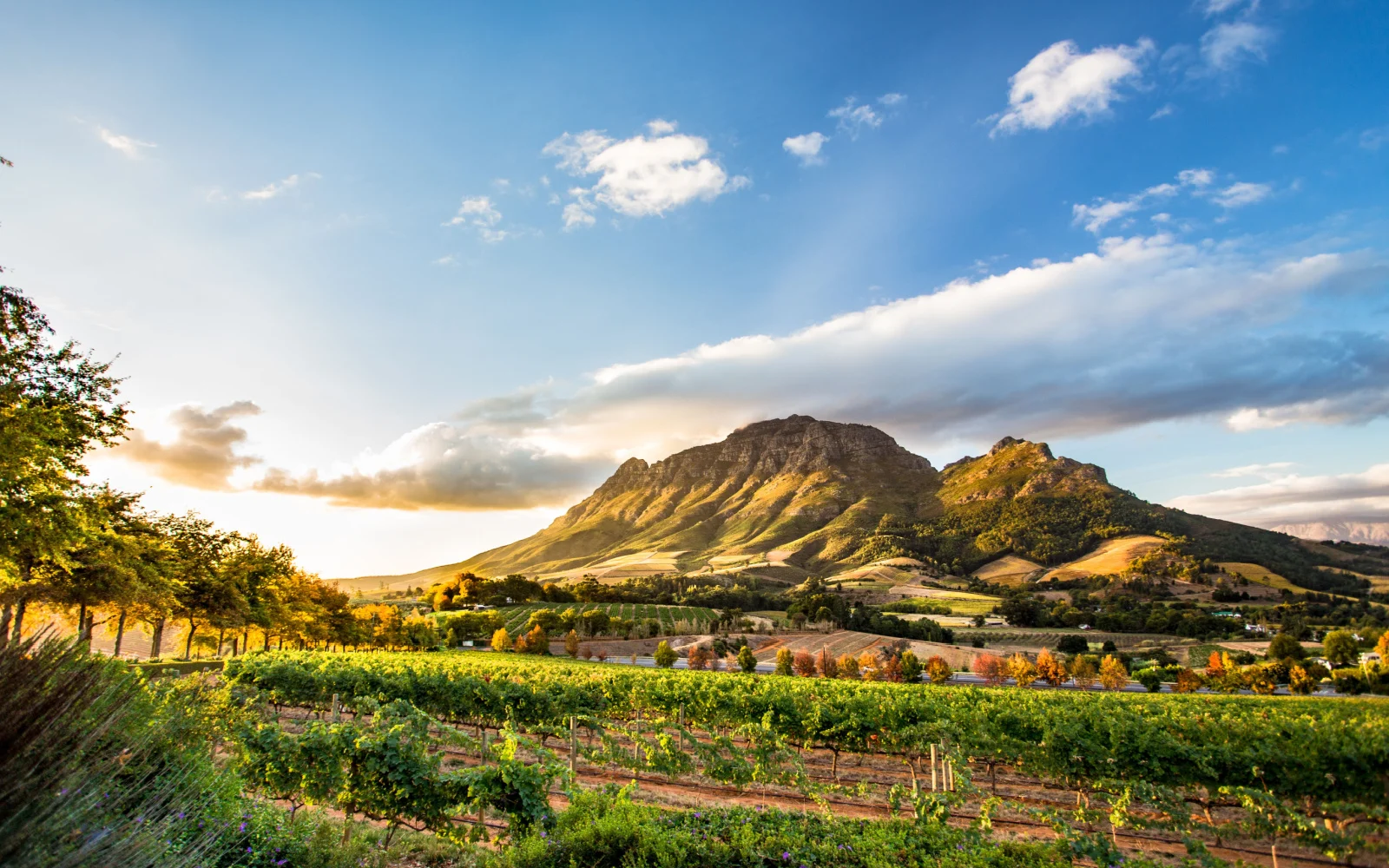The beautiful continent of Africa is a bucket list destination for many travelers. People flock there to see wildlife in its natural habitat that you can’t find anywhere else, from gorillas in the forest to lions in the savannah.
The Sahara Desert, rainforests, and mountains are ripe for adventure tourism. Others visit Africa to explore the rich history and culture that make up the 54 countries and even more ethnic groups that call the continent home.
From the ancient history of Egypt in the north to the ultra-modern vibrant metropolises of South Africa, there is so much to see on this storied continent. But is Africa safe to visit? Here’s our take.
Is Africa Safe to Visit in 2025?

PhotoSky/Shutterstock
It’s impossible to answer this question because there are so many countries in Africa. Some of them are safe, while others are active war zones. Just as with any continent, you will have to plot out your route to make sure you only visit safe areas.
To get an idea of the diversity of security situations on the African continent, check out a travel advisory map such as this one from the United States State Department.
While some countries on the African continent have strict “do not travel” advisories in place, others, such as Comoros, Seychelles, and Zambia, have no travel advisories in place.
For comparison, those are lower risk levels than traveling to France or Germany, according to the State Department’s own system of travel advisories. Before visiting Africa, many visitors have various concerns about traveling there.
These include:
- Armed conflict
- Homicide
- Kidnapping
- Armed robbery
- Sexual assault
- Theft
- Natural disasters
- Disease
While some parts of Africa certainly struggle with war and strife, and the continent is overall poorer than most of the rest of the world, a lot of this perception is based on negative stereotypes.
Academic journals have examined why Westerners tend to have such negative perceptions of the African continent (and to what extent Africans themselves share in that perception). A lot of the perception is based on stereotypes and racism.
That being said, it is true that travel in Africa comes with additional challenges. Some countries are at war, while others have been at war for decades or are just emerging from conflict.
The poverty level is much higher than most tourists are used to back home, as are levels of corruption, creating perfect conditions for crime. Crime is prevalent throughout the continent — then again, it is prevalent throughout the world.
In some places, such as popular tourist destinations, the most common crimes are simple crimes of opportunity. In other places, organized crime syndicates and armed groups perpetrate much more violent crimes.
Traveling to Africa will require some more preparation than traveling down the road to the neighboring town, but so will traveling anywhere.
Before you go, be sure to research travel advisories specifically for the countries and sometimes the cities and regions you will be visiting. That is the best way to accurately assess if you will be safe in Africa.
However, the best way to avoid dangerous areas is to leave the planning to the experts.
We highly recommend veteran tour operators like Go2Africa. Their staff each take at least one trip to Africa each year to ensure that they’ve seen the experiences they’re booking first-hand.
Crime in Africa

Myroslava Bozhko/Shutterstock
Besides conflict, the other problem most tourists to Africa list as their top concern is crime. Again, it is difficult to generalize for an entire continent, but crime does happen in Africa, often directed against foreigners.
Many countries list crime as a potential problem in their travel advisories for individual African countries. For example, the Australian government tells citizens to exercise a high degree of caution due to the threat of crime in Kenya, Madagascar, and South Africa.
Crime is prevalent in Africa. Although the extent of data collection varies from country to country, making accurate statistics difficult, many people report seeing or being the victim of pickpockets, scammers, and bag snatchers.
Petty thieves bother locals as well, but they often target tourists because they know foreigners with enough money to travel are likely much wealthier than locals.
A bigger problem is the high rate of serious crime. Many countries in Africa struggle with organized crime or even militia groups that branch out into criminal activity.
According to Statista data collected from the ENACT Organized Crime Index, several countries score above a 7 on the criminality index, which is rated out of 10.
These countries are the Democratic Republic of the Congo, Nigeria, and the Central African Republic. High levels of corruption, low levels of governance, and other factors create perfect conditions for criminal groups to thrive.
These groups are behind much of the violent crime that happens in Africa. However, it’s important to keep in mind that these groups are not evenly distributed across the continent — or even across an individual country.
Some countries have barely any organized criminal activity. Even in countries that have high levels of criminality, such as Kenya, the most violent acts are confined to certain areas, such as violent parts of Nairobi or the Somali border.
That is why it’s important to check specific regional travel advisories before you visit Africa. Homicide rates are also high in Africa. According to UNODC, Africa is the region with the second-most homicides in the world, following the Americas combined.
The homicide rate is 9.40 incidents per 100,000 people.
Murders occur as part of armed conflict, during battles between various factions of organized crime syndicates, and as an escalation of gender-based violence. The crime statistics paint a grim picture of Africa, but the reality on the ground can be very different.
Again, certain countries such as South Africa or South Sudan drive up the crime statistics for the whole continent.
Plus, many incidents of violent crime primarily target locals, not foreigners. Foreigners also have access to better security, from insured tour groups to special tourism police in certain countries, that can help keep them safe.
Petty Theft
If tourists are the victim of a crime in Africa, it usually is a form of petty theft. Petty theft is pretty much omnipresent in the world, and the African continent is no different.
Anywhere where you find groups of often-lost people with disposable income, you’ll also find people willing to take advantage of them. Pickpocketing is a common problem in many popular African tourist destinations as well as the continent’s busiest cities.
Not even the rich and famous are immune — American rapper Meek Mill was allegedly pickpocketed in Ghana. Some destinations that are notorious for their pickpockets are the souks in Morocco, ancient Egyptian sites in Egypt, and Cape Town in South Africa.
However, for some perspective, keep in mind that most international lists of places with the worst pickpocketing list European cities as the worst!
The way to protect against pickpockets is universal, no matter where you are in Africa (or at home, for that matter). Make sure that your valuables are secured in a front pants pocket or inner zipped compartment of your bag.
Walk with purpose to avoid looking like an easy target. Don’t flash valuables such as jewelry or watches as that singles you out compared to locals.
Scams are also popular throughout Africa, as they are throughout the world. Common scammers are usually taxi drivers, some of whom are not actual taxi drivers at all, who will jack up the fares for foreigners.
Make sure you use only reputable types of transportation. Other scams include money exchange stalls at street markets that offer better rates than official exchange bureaus.
Avoid these stalls as they often pass counterfeit bills or purposefully miscount to cheat foreigners. Market stalls will sometimes charge you more than locals. Haggling is acceptable, but try not to go overboard.
A matter of pride to you might be a matter of survival for the vendors and their families. In general, common sense measures can protect you from petty theft, no matter where you are in Africa.
Assault
Most visitors to Africa are worried more about violent crime than petty theft, with good reason. Violent crime rates on the African continent are in fact some of the highest in the world. The most common violent crime is assault.
Tourists often experience assault in the form of armed robbery. Individuals or gangs will wait in isolated areas, including some popular hiking trails, to attack and rob unsuspecting visitors.
Sometimes, gangs will organize roadblocks to commit highway robbery and assault. Before visiting a destination, read up on the travel warnings and consult local sources about the risk of assault.
Follow any recommended precautions, such as avoiding certain areas or not driving at night. As a rule of thumb, travel in groups if you feel uncertain about your safety. Avoid isolated areas such as side streets.
If you can, avoid traveling between cities at night, as rural areas in some countries are less safe than the cities. Female tourists should also worry about the possibility of sexual assault.
Many countries in Africa struggle with high rates of gender-based violence. For example, South Africans were shocked in 2022 after 84 men were implicated in a case of gang rape.
Although local women are sadly the most common victims of sexual assault, there have been situations where female travelers were targeted as well. If you are assaulted, seek medical attention immediately, as rates of HIV infection are high throughout the continent.
Avoiding Bad Areas

photograph taken in the Kibera slums in Nairobi during the stay of the Pope in Kenya. more than 500,000 people live here without essential services/Andrea Trevisani/Shutterstock
As we’ve mentioned a few times, the safety situation varies drastically throughout the African continent. As such, avoiding bad areas is key to helping yourself stay safe.
Certain countries are at war, in the throes of civil war, or undergoing different insurgencies, and you should avoid traveling to them at all.
These include the Central African Republic, Burkina Faso, Libya, Mali, Niger, Somalia, and South Sudan. Other countries are highly unstable, such as the Democratic Republic of the Congo. Always check regional advisories before you visit a country.
For example, if a country borders a state at war, foreigners are advised against traveling to the border area as warring groups sometimes operate over the border.
For example, when visiting Egypt, avoid traveling to the Libyan border. Most big African cities have neighborhoods that are more dangerous than others.
Avoid shantytowns or slums, as those tend to be the operating base for violent criminals. As always, the best way to find out how to avoid bad areas is to check specifically for your destination.
Things to Consider
Here are a few things to keep in mind before visiting the African continent:
- Diseases such as yellow fever and malaria are prevalent in Africa. Make sure you get necessary vaccinations before you go.
- Tap water isn’t usually safe to drink. Drink bottled, distilled water instead.
- Attitudes towards LGBT people differ widely across the continent. While Cape Town in South Africa is the gay capital of the continent, LGBT people in other countries, such as Uganda, face discrimination and violence. Be careful if you are an out traveler.
Frequently Asked Questions

Andrzej Kubik/Shutterstock
Here are some other questions you might want answered before visiting Africa:
What is the safest African country to visit?
The safest African country to visit is the island paradise of Mauritius. Of the 54 countries on the continent, it has the highest score on the Global Peace Index.
Are African tours safe?
If you’re visiting Africa on an organized tour, you will probably be safe. The organizers do additional research and take many precautions to ensure the safety of their guests.
Is it safe to travel to Africa as a woman?
The answer depends on the destination as well as your risk tolerance. If you are traveling with a group to a safe location, you should have a great time. Solo female travelers also visit Africa, but try to vet accommodations thoroughly before you go and trust your instincts.
Is it cheap to travel to Africa?
The answer depends on your traveling style. Many foreign visitors to Africa flock to expensive safaris and luxury beach resorts. However, you can have a budget African vacation by staying in local accommodations, taking public transportation, and going on modest tours.
Where should I go for the first time in Africa?
On your first visit to Africa, accept that you can’t see the whole continent! It’s better to focus on a region, such as the vibrant North African countries of Morocco and Tunisia or the beautiful nature of southern Africa.
So Is Africa Safe to Visit in 2025?
The African continent is vast, containing war-torn countries as well as incredibly safe destinations. Do your research before you go and you should have a good time. So, what are you waiting for — book your trip to this gorgeous continent today!



